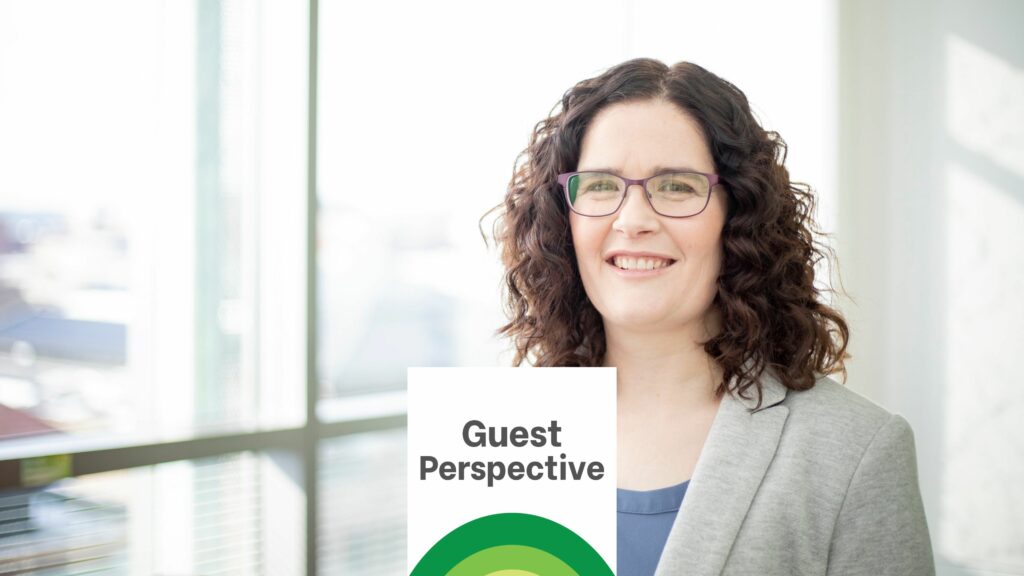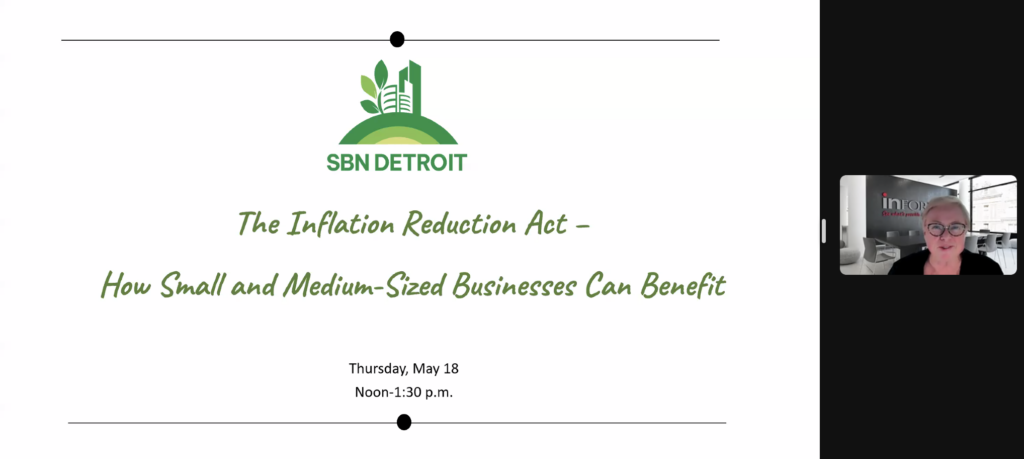Moving Toward a More Just and Sustainable Future in Southeast Michigan

Sara Soderstrom is an associate professor in Organizational Studies and Program in the Environment and the Erb Undergraduate Fellows faculty director at the University of Michigan. Sustainability has evolved significantly over the years. At the University of Michigan’s Erb Institute for Sustainability in Business, this evolution includes working toward market transformation: business transforming the market to make it more sustainable. We can’t be thinking only: ‘How do we do less bad? How do we pollute less? How do we use fewer resources?’ We need to actually think about ‘How do we do more good?’ That fundamentally pivots the way that you think about business—it’s much more of a proactive than reactive conversation. It also centers justice in a way that early business sustainability didn’t. This shift changes the local vs. global dynamic to consider the local as part of the global system, and it sharpens the focus on small and midsize businesses. It also considers supply chains and key stakeholders more broadly. A study that I conducted with Kathryn Heinze, associate professor in the School of Kinesiology at the University of Michigan, shows some of the ways these shifts are happening. The study focused on the nonprofit FoodLab, which was operating in Detroit at the time. FoodLab aimed to promote healthy, environmentally sustainable, and accessible food systems and to grow a good food economy by working with its members: local food entrepreneurs. One thing that we realized as we were working with local entrepreneurs was a focus on being embedded in place—what is Detroit? What is the commitment to the city? What is the future for the city we envision? And how do we place ourselves in that future as entrepreneurs? With this network of businesses, there was a strong motivation not just for the financial viability of the business, but for doing good through business. But at the same time, these entrepreneurs have resource constraints, so there are tradeoffs. How do you balance things like a living wage with ensuring composting or locally sourced materials? FoodLab helped ease some of these constraints by serving as a connector that lowered the barriers to entry around sustainability. This way, each entrepreneur didn’t need to have all the answers or all the resources—they could get the information they needed about sourcing, financing, or best practices through the network. FoodLab functioned as part incubator, part social movement organization, connecting folks with these shared interests to collectively learn, but also as the space that could aggregate these resources and make them accessible to people, so that they could more effectively move forward towards sustainability and justice goals. FoodLab asserted that they couldn’t have a just and sustainable food economy if there wasn’t engagement, ownership, and voice from diverse entrepreneurs that reflect the City of Detroit. So they had a lot of intentionality around diversity and engagement, both in who was participating as entrepreneurs in the network, but also in what they were prioritizing as their goals as an organization. It was centering equity and justice in almost every conversation and decision they were having. The ways that FoodLab built its organizational practices and structured conversations made sure that everyone involved felt like they were heard, even in contentious conversations, which built trust and helped them move collectively towards this more just and sustainable imagined future. The Erb Institute – a partnership of the Ross School of Business and the School for Environment and Sustainability at the University of Michigan -. works to create a sustainable world through the power of business. Somewhat like FoodLab, we also serve as an enabling network. The students are the key actors, We are the convener, and then the network continues with alumni who are now 10 to 20 years out but still lean into us and each other for support as they work toward solutions to sustainability and justice challenges. Two of our key programs are: Impact Projects, through which students design projects, often working directly with businesses or partnering with businesses and community partners on organization-led projects. The projects give businesses access to students who have time, expertise, and passion around sustainability and justice efforts, who can help them focus on an issue—such as supply chain, procurement, or skills redevelopment. Erb on the Road, which brings both graduate and undergraduate students to businesses, nonprofits, and other organizations across Michigan. The program allows students to engage with a variety of different types of businesses and nonprofits that are focused on local sustainability challenges and figure out solutions for them. For undergrads specifically, what has been powerful is hearing them reflect on learning what is happening locally—which makes what we talked about in the textbook real—but their experiences are helping them recognize that business and sustainability is an available career path. People are committed to sustainability in myriad ways, and you don’t need to wait until you are chief sustainability officer to do sustainability. The Erb Institute is focused on preparing future leaders – and also service to the state of Michigan. We want students to recognize that being part of the University of Michigan isn’t just the Ann Arbor campus – it’s also the state and world. So we work to help focus that commitment to: What does it really mean to be the leaders and the best? Supporting and engaging locally in Detroit and across Michigan is part of that. Be sure to subscribe to our newsletter for regular updates on sustainable business practices in and around Detroit.
The Inflation Reduction Act – How Small and Medium-Sized Businesses Can Benefit

The Inflation Reduction Act of 2022 includes $500 billion in new spending and tax breaks targeted toward climate change, clean energy, training, and workforce development, the development of clean infrastructure, and more. It puts the U.S. on a path to 40% emissions reduction by 2030 with these desired impacts: Lower energy costs Increased energy security Investments in decarbonizing all sectors Focused investments in disadvantaged communities Support for resilient rural communities Additionally, the legislation act offers businesses and entrepreneurs unprecedented opportunities but identifying these opportunities and navigating how to capitalize on them can be daunting. To help small- and medium-sized businesses understand the act, SBN Detroit held a virtual event on May 18 featuring Joel Howrani Heeres, director, Public Sector Consultants; Jerry Davis, professor, Ross School of Business; Dan Radomski, executive director, Centrepolis Accelerator at Lawrence Tech University, and Kimberly Hill Knott, president and CEO, Future Insight Consulting. Each speaker presented according to their areas of expertise, followed by a Q & A. We’ve shared some of the speakers’ points below. You can view the full event here. A significant portion of IRA rebates goes to homeowners, creating an opportunity for contractors to provide energy audits, electrification upgrades, and more. The funds allow for roughly 5,000 houses to take advantage of rebates. – Howrani There are five components involved in creating an enterprise – capital, labor, organization, supply, and distribution. The IRA creates opportunities within each of these components. – Davis When it comes to cleantech funding, it’s important to understand what stage of development you are in and how that applies to different funding opportunities. Generally, funding comes in when technologies are mature and ready for deployment. But there are different opportunities within the different stages. – Radomski As we transition to the Infrastructure Investment and Jobs Act (IIJA) there will be more investments in infrastructure, and the money will flow through state agencies and departments. – Radomski The key to being e successful with IRA funding is collaboration. Addressing climate change is multifaceted. For example, residential electrification dollars are coming. but many houses are not necessarily ready to replace fossil fuel sources with electricity. So, there is an opportunity to partner with community action agencies that manage funds for home repair to get homeowners ready. For example, the community action agency essentially does intake and prep, and a private contractor does the electrification work to use the rebates. – Howrani There are new opportunities up and down the supply chain from technicians to engineers to manufacturing. This is going to take an effort in workforce development by universities, community colleges, and manufacturers themselves. We need education in all of these areas which will lead to jobs and wealth creation. – Radomski My students surveyed local small businesses regarding their priorities around green energy. The overwhelming response was reliability. For these businesses, extended power outages could be catastrophic. This presents an opportunity – how do we solve this? – Davis Understanding that the IRA is not easily interpreted, I had my students translate parts of it into easy-to-understand How to Guides and also sample business models which can be found at Greenbiztransition.com View the full presentation and Q&A here. Be sure to subscribe to our newsletter for regular updates on sustainable business practices in and around Detroit.


